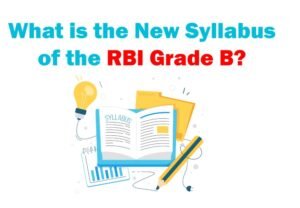
Dreaming of joining the Reserve Bank of India (RBI) as an RBI Grade B officer then you know that thorough preparation is key. And the foundation of an effective preparation strategy is a complete understanding of the newest RBI Grade B syllabus.
But, what’s in the latest syllabus of the RBI Grade B exam? Let’s look at it step by step, for each phase of the exam.
New RBI Grade B Phase 1 Syllabus
While the official RBI Grade B notification doesn’t explicitly detail the Phase 1 syllabus, a strategic approach to identify key topics involves analyzing previous years’ question papers.
By understanding the frequency of questions asked in each subject, you can understand the detailed syllabus of Phase 1. It allows you to effectively prioritize high weightage topics for the RBI Grade B Phase 1 exam.
To save you valuable time and effort, the following are key topics that have consistently appeared in the RBI Grade B Phase 1 exam over the past 5 years:
RBI Grade B Syllabus for Reasoning
- Puzzles
- Alphabetical, Alphanumeric Series
- Inequality
- Statement – Assumption
- Syllogism
- Coding & Decoding
- Ranking
- Cause and Effect
- Seating Arrangement
- Statement – Course of Action
- Statement Conclusion
- Machine Input Output
- Data Sufficiency
- Blood Relation
- Direction Sense
- Statement Argument
RBI Grade B Syllabus for Reasoning
- Data Interpretation & Data Sufficiency
- Simple & Compound Interest
- Time & Work
- Percentage
- Time, Speed, & Distance
- Trains & Boats
- Mixture
- Average
- Ages
- Probability
- Quadratic Equation
- Quantity Comparison
- Profit & Loss, Discount
- Ratio & Proportion
- Simplification
- Pipes & Cistern
- Number Series & Number System
- Partnership
- Area, Volume
RBI Grade B Syllabus for English
- Grammar
- Error Spotting
- Para Jumbles
- Double Fillers
- Comprehension Ability
- Comprehension passage
- Cloze Test
- Sentence Improvement
- Rearrangement
- Vocabulary – Synonyms, Antonyms, One-word Substitution, and Phrasal Verbs
RBI Grade B Syllabus for General Awareness
RBI Grade B GA syllabus is divided into 2 parts:
RBI Grade B Syllabus for GA Current Affairs
- National News: MoUs, summits, and major events related to India.
- International: Summits and conferences held abroad.
- Financial & Economics News
- Financial Awareness: RBI and SEBI Notifications and Regulations
- Defence: Military exercises, drills, and major updates related to the defence sector of India
- Days in News: Major events or days, along with their date and theme
- Persons in News: Obituaries, appointments, retirements
- Sports: Major tournaments and their winners
- Science, Technology, and Space
- Awards and Honours
- Environment
- Banking, Economy-related news
- Reports and Government Schemes
- Books and Authors
RBI Grade B Syllabus for GA Static
- Chief Ministers and Cabinet Ministers
- National Parks and Sanctuaries
- Airport Locations, Stadiums
- Organisations’ Headquarters
- Banks’ Headquarters and Taglines
- Power Plants in India
- Indian Dance Forms
- Countries, Capitals and their Currencies
- Important Days
Now that you have understood the new syllabus of the RBI Grade B Phase 1, let’s understand the Phase 2 syllabus.
New RBI Grade B Phase 2 Syllabus
As per the official notification, the newest subject-wise RBI Grade B syllabus is mentioned below:
RBI Grade B Syllabus for Economic and Social Issues (ESI)
- Growth and Development: Measurement of growth: National Income and per capita income – Poverty Alleviation and Employment Generation in India – Sustainable Development and Environmental issues.
- Indian Economy: Economic History of India – Changes in Industrial and Labour Policy, Monetary and Fiscal Policy since reforms of 1991 – Priorities and recommendations of Economic Survey and Union Budget – Indian Money and Financial Markets: Linkages with the economy – Role of Indian banks and Reserve Bank in the development process – Public Finance – Political Economy – Industrial Developments in India- Indian Agriculture – Services sector in India.
- Globalization: Opening up of the Indian Economy – Balance of Payments, Export-Import Policy – International Economic Institutions – IMF and World Bank – WTO – Regional Economic Co-operation; International Economic Issues
- Social Structure in India: Multiculturalism – Demographic Trends – Urbanisation and Migration – Gender Issues
RBI Grade B Syllabus for Descriptive English
The official RBI Grade B notification does not specify a descriptive English syllabus. Generally, three questions are asked from the following topics:
- Essay: You need to choose 1 essay topic from 4-5 options and write an essay within the word limit of 400 to 600 words.
- Precis Writing: Here you need to summarize the given passage of 400 to 600 words into 170 to 180 words.
- Reading Comprehension: RC includes a 400-600 word passage, followed by 5 questions.
RBI Grade B Syllabus for Finance and Management
Below, I have mentioned RBI Grade B syllabus for finance and management:
Finance Syllabus:
- Financial System
- Structure and Functions of Financial Institutions
- Functions of the Reserve Bank of India
- Banking System in India – Structure and Developments, Financial Institutions – SIDBI, EXIM Bank, NABARD, NHB, NaBFID, etc.
- Recent Developments in the Global Financial System and its Impact on Indian Financial System
- Role of Information Technology in Banking and Finance
- Non-Banking System
- Developments in Digital Payments
- Financial Markets
- Primary and Secondary Markets (Forex, Money, Bond, Equity, etc.), functions, instruments, and recent developments.
- General Topics
- Financial Risk Management
- Basics of Derivatives
- Global financial markets and International Banking – broad trends and latest developments
- Financial Inclusion
- Alternate source of finance, private and social cost-benefit, Public-Private Partnership
- Corporate Governance in the Banking Sector
- The Union Budget – Concepts, approach, and broad trends
- Basics of Accounting and Financial Statements – Balance Sheet, Profit and Loss, Cash Flow Statements, Ratio Analysis (such as Debt to Equity, Debtor Days, Creditor Days, Inventory Turnover, Return on Assets, Return on Equity, etc.)
- Inflation: Definition, trends, estimates, consequences, and remedies (control): WPI- CPI – components and trends; striking a balance between inflation and growth through monetary and fiscal policies.
Management Syllabus:
- Fundamentals of Management & Organizational Behaviour:
- Introduction to management; Evolution of management thought: Scientific, Administrative, Human Relations and Systems approach to management; Management functions and Managerial roles; Nudge theory
- Meaning & concept of organizational behaviour; Personality: meaning, factors affecting personality, Big Five model of personality; concept of reinforcement; Perception: concept, perceptual errors. Motivation: Concept, importance, Content theories (Maslow’s need theory, Alderfers’ ERG theory, McCllelands’ theory of needs, Herzberg’s two factor theory) & Process theories (Adams equity theory, Vrooms expectancy theory).
- Leadership
- Concept, Theories (Trait, Behavioural, Contingency, Charismatic, Transactional and Transformational Leadership; Emotional Intelligence: Concept, Importance, Dimensions. Analysis of Interpersonal Relationship: Transactional Analysis, Johari Window; Conflict: Concept, Sources, Types, Management of Conflict; Organizational Change: Concept, Kurt Lewin Theory of Change; Organizational Development (OD): Organisational Change, Strategies for Change, Theories of Planned Change (Lewin’s change model, Action research model, Positive model).
- Ethics at the Workplace and Corporate Governance
- Meaning of ethics, why ethical problems occur in business. Theories of ethics: Utilitarianism: weighing social cost and benefits, Rights and duties, Justice and fairness, ethics of care, integrating utility, rights, justice and caring, an alternative to moral principles: virtue ethics, teleological theories, egoism theory, relativism theory, Moral issues in business: Ethics in Compliance, Finance, Human Resources, Marketing, etc. Ethical Principles in Business: introduction, Organization Structure and Ethics, Role of Board of Directors, Best Practices in Ethics Programme, Code of Ethics, Code of Conduct, etc.
- Corporate Governance:
- Factors Affecting Corporate Governance; Mechanisms of Corporate Governance
- Communication
- Steps in the Communication Process; Communication Channels; Oral versus Written Communication; Verbal versus non-verbal Communication; upward, downward and lateral communication; Barriers to Communication, Role of Information Technology.
RBI Grade B Syllabus for Interview
There is no information mentioned on the official RBI Grade B notification. However, you should thoroughly prepare your bio-data and stay updated on current affairs to prepare for the interview stage.
Final Thoughts
A thorough understanding of this detailed RBI Grade B syllabus for both Phase 1 and Phase 2 is the first crucial step towards success. You are advised to carefully go through topics to each subject, plan your preparation accordingly, and stay updated on current affairs, especially in the financial and economic sectors. Remember, consistent study and practice will help you in this competitive exam.
Good luck with your preparation.





